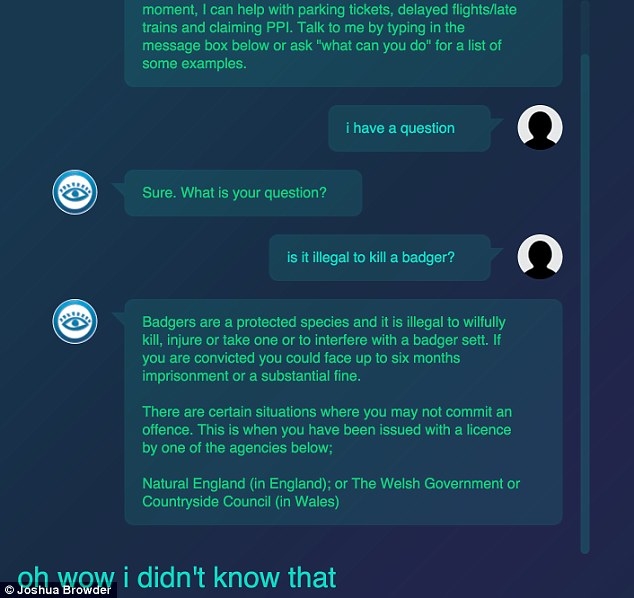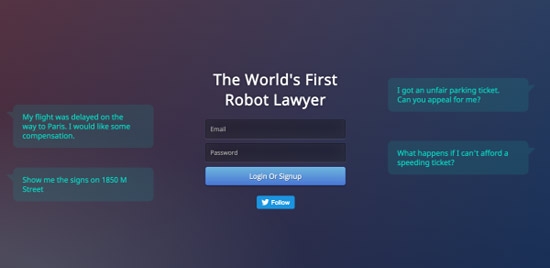
People's feelings about robots can be quite complicated. On the one hand, being snatched by robots has become a source of anxiety for many people; on the other hand, many people are grateful for robots that can benefit everyone. A chat robot called DoNotPay, developed by Joshua Browder, a 19-year-old sophomore at Stanford University, is a wonderful example of the latter. DoNotPay is the world’s first lawyer robot. Since its first version was introduced in London, it has won 160,000 lawsuits against municipal governments for fines in violation of fines.

It is reported that DoNotPay was launched in New York in March this year. In recent years, traffic fines for New York residents have continued to increase. In 2015, it reached a record high of US$1.9 billion. The emergence of DoNotPay has brought them great news.
After the robot software was launched, it was warmly welcomed by people. Browder's mailbox was full of many questions about the law. He disclosed his mailbox and he could contact him with any questions or requests related to the law. More importantly, he does not charge any service fees.
Users can log in to the DoNotPay website and click on the automated service system. The webpage will jump out of the instant messenger software. The user can chat with the robot on the software. Users can ask them related questions. After the question is over, the robot will convert the information entered by the user into a legal sound file, and then based on these questions and sound files to determine whether there is a basis for appeal, and then guide users step by step to appeal. Today, the scope of use of this robot software has been extended to the compensation lawsuit for flight delays, bringing new legal aid channels for users.

Browder is everyone's little angel. He has received many praises. The BBC also called him "Internet Robin Hood." Now, this "welfare robot" can do more than just ticket and flight delays, it can also help those who are homeless to have a warm home again.
DoNotPay has been able to get this skill and has to start with an email.
This email was from the hand of a woman in a British hospital. She wrote in the e-mail that she was afraid that she would be discharged immediately after the treatment was finished, because she had been expelled from her home and once she was discharged, she would be left homeless. The message is full of desperation.
In the end, this email was delivered to Joshua Browder's inbox. Browder was very touched after receiving this email. He said:
After I started to solicit questions, I received a lot of e-mails about expelling and repossessing homes. It can be said that such e-mails will be the most. When I realized that I didn't have enough knowledge and ability to help this group of people, especially when I saw someone already homeless, I was very uncomfortable.
In the UK, government housing can only be provided to the latest batch of homeless people. For this poor woman, if she wants to live somewhere, she must write and submit her application letter. For people like her, if there is not enough legal knowledge and money, there is no way to apply for a shelter.
Therefore, Browder decided to extend the service period of DoNotPay and write relevant legal documents for these low-level people free of charge to help them successfully apply to government housing. Users only need to visit DoNotPay.co.uk, register, and then answer questions related to their current personal situation, such as the reasons for homelessness or any specific illnesses. The robot can automatically generate a complete application form and can apply for a home to the largest possible number of users. For example, if someone responds with a mental illness, the robot will focus on this when writing a letter of appeal.

According to the British "Guardian" report, the rate of eviction in the United Kingdom is high. With the reduction of welfare and rental growth, the expulsion rate from 2010 to 2015 has increased by 53%. Last year, 42,728 households were released from their housing contracts. In addition, since the financial crisis of 2008, many Americans’ houses have been mortgaged and the possibility of recovery has been low. Therefore, the housing problem in Britain and the United States is actually very serious.
Last year, Browder became a student at Stanford University and he also hopes to introduce a home robot to New York soon. Housing applications are now available online, Browder said:
I hope DoNotPay can help more homeless people. However, the situation is not the same in every jurisdiction, and not all areas have consistently given thumbs up to this robot. For example, a reception center in New York is still doubtful about DoNotPay's ability in this area.
The person in charge of the center said:
Admittedly, robots are very useful, but it also has many shortcomings. The situation of our customers is not exactly the same, but it is very complicated to deal with. I am concerned that the loopholes in this process will violate the law and cause trouble. For example, factors such as immigration status, mental illness, and criminal records also place great restrictions on the use of the robot. In addition, many tenants are generally more inclined to find private lawyers to help them in the face of deportation. These issues are more complicated than non-compliance, so we must be more careful. I believe that such problems will surely find better solutions, and the key is to increase government investment to build more housing.
However, Browder still believes that DoNotPay is more suitable for low-income people and disadvantaged groups who are deprived of citizenship, because it is more cost-saving. As of 2014, DoNotPay Software's successful non-payment expenses reached US$4 million. Browder also said that many companies facing bankruptcy now want to use DoNotPay to tap and evaluate potential customers for them and automate the entire filing process.
DoNotPay is so popular, and behind it is a hint of sadness: too many vulnerable groups need help; or, normal legal litigation services are too expensive. Browder said:
I think DoNotPay can replace the lawyer's position. It can help people to regain their home for free, which makes me feel more or less ironic.
Via:The Washington Post
